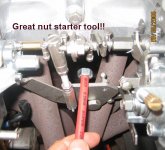T
Tinster
Guest
Guest
Offline
I went out to purchase a torgue wrench
to install the exhaust manifold and new
carbs and intake manifold to 25# .
$130 for a 5# to 50# range model!!!!
One look at it and I knew it could not reach
into some of the nuts and bolt heads.
I over torqued a nut today and stripped off a
stud. Four hours to pull off everything to extract
the stud, etc, etc.
How does one measure or geusstimate torque?
The $139. wrench would not have reached to nut
and stud I ruined today.
Thanks,
D
to install the exhaust manifold and new
carbs and intake manifold to 25# .
$130 for a 5# to 50# range model!!!!
One look at it and I knew it could not reach
into some of the nuts and bolt heads.
I over torqued a nut today and stripped off a
stud. Four hours to pull off everything to extract
the stud, etc, etc.
How does one measure or geusstimate torque?
The $139. wrench would not have reached to nut
and stud I ruined today.
Thanks,
D

 Hey there Guest!
Hey there Guest!
 smilie in place of the real @
smilie in place of the real @
 Pretty Please - add it to our Events forum(s) and add to the calendar! >>
Pretty Please - add it to our Events forum(s) and add to the calendar! >> 

 A friendly reminder - be careful what links you click on here. If a link is posted by someone you don't know, or the URL looks fishy, DON'T CLICK. Spammers sometimes post links that lead to sites that can infect your computer, so be mindful what you click.
A friendly reminder - be careful what links you click on here. If a link is posted by someone you don't know, or the URL looks fishy, DON'T CLICK. Spammers sometimes post links that lead to sites that can infect your computer, so be mindful what you click.